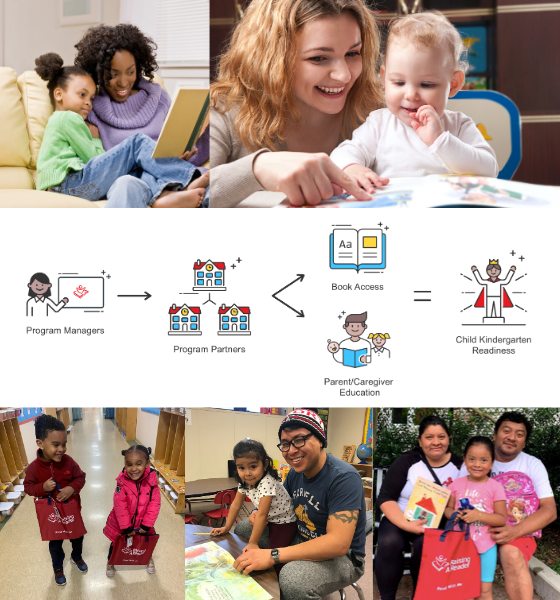RAR | Overview
Research suggests that around 25% of caregivers never read with their children.[1] Children who are read to at earlier ages are more likely to have larger vocabularies and pick up reading quickly in elementary school. Raising A Reader Massachusetts (RAR-MA) tackles this gap by engaging families in building literacy skills from birth to age 6 through developing shared reading routines at home.
RAR-MA, an affiliate of a national program, offers access to books through its Red Book Bag Program. Each child enrolled in the program through his/her preschool, home visiting program, playgroup or other community-based programs has his/her own Red Book Bag and each week the bag is filled with 4 age-appropriate and culturally relevant books. RAR-MA trains partner programs on how to circulate the bags, the program logistics, and how to communicate with families. RAR-MA’s two-generational model also educates parents and caregivers to understand the importance of reading with children and teaches adult caregivers how to use dialogic reading, a technique that involves asking the child questions while reading to them. There are numerous benefits to interactive reading including social and emotional development through bonding with a parent or caregiver.

Growing early literacy and family engagement
The Boston Children’s Collaboration for Community Health funding allows RAR-MA to grow and expand its reach in Greater Boston by adding 200 additional families each year (600 families total) for the Red Book Bag program and parent/caregiver workshops. The funds are also helping to grow and formalize the Parent Ambassador program, which uses volunteers who have formerly participated in the program at one point to lead workshops in the community. Though the Parent Ambassador program has existed for some time and some Parent Ambassadors have been engaged for many years, RAR-MA is formalizing and growing this training and demonstrating the program’s impact. RAR-MA aims to build and maintain a cohort of at least five Parent Ambassadors in both Boston and Chelsea. Funding also will be used for evaluation and program improvement efforts related to tracking and using technology to make processes and systems more efficient.
Evaluation
RAR-MA will assess reading frequency and quality with survey questions that measure how many times the parent or caregivers read to his/her child in the last seven days and if they ask open-ended questions when reading to their child. Partner programs also report outcomes—specifically if they notice an improvement in quantity and quality of home reading based on interaction with RAR-MA. RAR-MA also tracks the reach of its programs and regularly assesses program fidelity.
Looking ahead
With the Collaboration for Community Health funding, RAR-MA understand the nuances implementation across partners and better understand the impact of the full RAR-MA program. This current effort will build knowledge and systems to support early literacy in families in Boston and across the country with other RAR affiliates. This funding will also help staff to quantify the impact of the Parent Ambassador program and to assess the best ways to increase its impact.
RAR-MA evaluation manager Kate Winder says parents and families get a lot out of Raising A Reader MA’s programs. “They share that reading has become a primary way to bond with their child, and changed their relationship with their child,” Kate says. “Hearing this feedback reminds me why our work is important. Shared reading routines at home does make an impact on both the caregivers’ and children’s lives.”
Boston Children’s Hospital receives Raising A Reader MA’s 2020 "Better Together" Strategic Partnership Award
We are Better Together.
RAR-MA believes in the power of strong partnerships and the Collaboration for Community Health has been a transformative opportunity for RAR-MA's Greater Boston programming.
For this reason, RAR-MA is hosting Better Together: A Winter Soirée event on February 25, 2020 to honor Boston Children’s Hospital.
For more information, please contact Mary Ann F. Lerner at maryann@raisingareaderma.org
